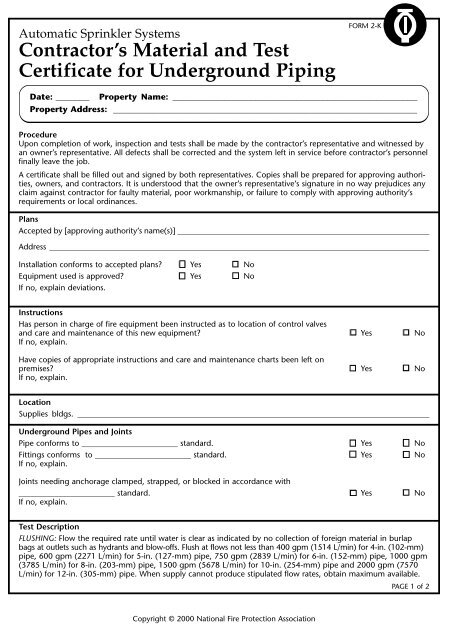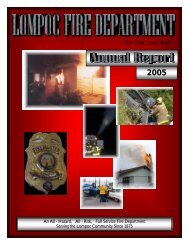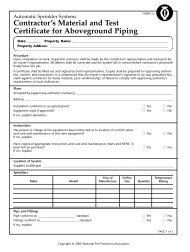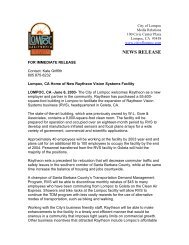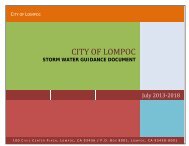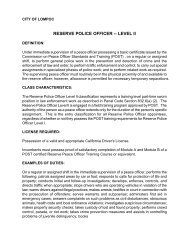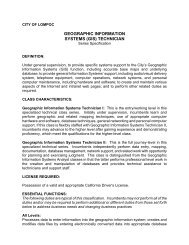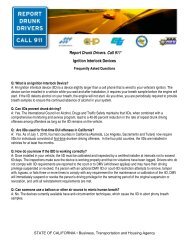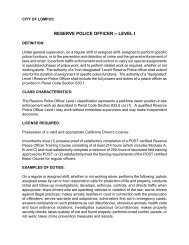Contractor's Material and Test Certificate for Underground Piping
Contractor's Material and Test Certificate for Underground Piping
Contractor's Material and Test Certificate for Underground Piping
You also want an ePaper? Increase the reach of your titles
YUMPU automatically turns print PDFs into web optimized ePapers that Google loves.
Automatic Sprinkler Systems<br />
Contractor’s <strong>Material</strong> <strong>and</strong> <strong>Test</strong><br />
<strong>Certificate</strong> <strong>for</strong> <strong>Underground</strong> <strong>Piping</strong><br />
FORM 2-K<br />
Date: ________ Property Name: __________________________________________________________<br />
Property Address: ________________________________________________________________________<br />
Procedure<br />
Upon completion of work, inspection <strong>and</strong> tests shall be made by the contractor’s representative <strong>and</strong> witnessed by<br />
an owner’s representative. All defects shall be corrected <strong>and</strong> the system left in service be<strong>for</strong>e contractor’s personnel<br />
finally leave the job.<br />
A certificate shall be filled out <strong>and</strong> signed by both representatives. Copies shall be prepared <strong>for</strong> approving authorities,<br />
owners, <strong>and</strong> contractors. It is understood that the owner’s representative’s signature in no way prejudices any<br />
claim against contractor <strong>for</strong> faulty material, poor workmanship, or failure to comply with approving authority’s<br />
requirements or local ordinances.<br />
Plans<br />
Accepted by [approving authority’s name(s)] _______________________________________________________________<br />
Address _______________________________________________________________________________________________<br />
Installation con<strong>for</strong>ms to accepted plans? ■ Yes ■ No<br />
Equipment used is approved? ■ Yes ■ No<br />
If no, explain deviations.<br />
Instructions<br />
Has person in charge of fire equipment been instructed as to location of control valves<br />
<strong>and</strong> care <strong>and</strong> maintenance of this new equipment? ■ Yes ■ No<br />
If no, explain.<br />
Have copies of appropriate instructions <strong>and</strong> care <strong>and</strong> maintenance charts been left on<br />
premises? ■ Yes ■ No<br />
If no, explain.<br />
Location<br />
Supplies bldgs. ________________________________________________________________________________________<br />
<strong>Underground</strong> Pipes <strong>and</strong> Joints<br />
Pipe con<strong>for</strong>ms to ________________________ st<strong>and</strong>ard. ■ Yes ■ No<br />
Fittings con<strong>for</strong>ms to ________________________ st<strong>and</strong>ard. ■ Yes ■ No<br />
If no, explain.<br />
Joints needing anchorage clamped, strapped, or blocked in accordance with<br />
________________________ st<strong>and</strong>ard. ■ Yes ■ No<br />
If no, explain.<br />
<strong>Test</strong> Description<br />
FLUSHING: Flow the required rate until water is clear as indicated by no collection of <strong>for</strong>eign material in burlap<br />
bags at outlets such as hydrants <strong>and</strong> blow-offs. Flush at flows not less than 400 gpm (1514 L/min) <strong>for</strong> 4-in. (102-mm)<br />
pipe, 600 gpm (2271 L/min) <strong>for</strong> 5-in. (127-mm) pipe, 750 gpm (2839 L/min) <strong>for</strong> 6-in. (152-mm) pipe, 1000 gpm<br />
(3785 L/min) <strong>for</strong> 8-in. (203-mm) pipe, 1500 gpm (5678 L/min) <strong>for</strong> 10-in. (254-mm) pipe <strong>and</strong> 2000 gpm (7570<br />
L/min) <strong>for</strong> 12-in. (305-mm) pipe. When supply cannot produce stipulated flow rates, obtain maximum available.<br />
PAGE 1 of 2<br />
Copyright © 2000 National Fire Protection Association
FORM 2-K<br />
Automatic Sprinkler Systems<br />
Contractor’s <strong>Material</strong> <strong>and</strong> <strong>Test</strong><br />
<strong>Certificate</strong> <strong>for</strong> <strong>Underground</strong> <strong>Piping</strong> (cont.)<br />
<strong>Test</strong> Description (cont.)<br />
HYDROSTATIC: Hydrostatic tests shall be made at not less than 200 psi (13.6 bar) <strong>for</strong> two hours or 50 psi (3.4 bar)<br />
above static pressure in excess of 150 psi (10.2 bar) <strong>for</strong> two hours.<br />
LEAKAGE: New pipe laid with rubber gasketed joints shall, if the workmanship is satisfactory, have little or no leakage<br />
at the joints. The amount of leakage at the joints shall not exceed 2 qts per hr. (1.89 L/h) per 100 joints irrespective<br />
of pipe diameter. The leakage shall be distributed over all joints. If such leakage occurs at a few joints the<br />
installation shall be considered unsatisfactory <strong>and</strong> necessary repairs made. The amount of allowable leakage specified<br />
above may be increased by 1 fl oz per in. valve diameter per hour (30 mL/25 mm/h) <strong>for</strong> each metal-seated<br />
valve isolating the test section. If dry barrel hydrants are tested with the main valve open, so the hydrants are<br />
under pressure, an additional 5 oz per minute (150 mL/min) leakage is permitted <strong>for</strong> each hydrant.<br />
Flushing <strong>Test</strong>s<br />
New underground piping flushed according to ______________ st<strong>and</strong>ard. ■ Yes ■ No<br />
By (company) ____________________________________________________<br />
If no, explain.<br />
How flushing flow was obtained: ■ Public water ■ Tank or reservoir ■ Fire pump<br />
Through what type opening ■ Hydrant butt ■ Open pipe<br />
Lead-ins flushed according to ________________________ st<strong>and</strong>ard ■ Yes ■ No<br />
By (company) ____________________________________________________<br />
If no, explain.<br />
How flushing flow was obtained ■ Public water ■ Tank or reservoir ■ Fire pump<br />
Through what type opening ■ Y connection to flange <strong>and</strong> spigot ■ Open pipe<br />
Hydrostatic <strong>Test</strong><br />
All new underground piping hydrostatically tested at ________ psi (bar) <strong>for</strong> ________ hours<br />
Joints covered? ■ Yes ■ No<br />
Leakage <strong>Test</strong><br />
Total amount of leakage measured: ________ gals (L) ________ hours<br />
Allowable leakage: ____________ gals (L) ____________ hours<br />
Hydrants<br />
Number installed: ________ Type <strong>and</strong> make: ___________________________________________________________<br />
All operate satisfactorily? ■ Yes ■ No<br />
Control Valves<br />
Water control valves left wide open? ■ Yes ■ No<br />
If no, state reason.<br />
Hose threads of fire department connections <strong>and</strong> hydrants interchangeable<br />
with those of fire department answering alarm? ■ Yes ■ No<br />
Remarks<br />
Date left in service with all control valves open: ____________<br />
______________________________________________________________________________________________________<br />
______________________________________________________________________________________________________<br />
Installing Contractor: _________________________________________________________________________________<br />
Signatures of <strong>Test</strong> Witnesses<br />
For property owner (signed) ___________________________________<br />
Title _________________ Date ____________<br />
For sprinkler contractor (signed) ________________________________ Title _________________ Date ____________<br />
PAGE 2 of 2<br />
Copyright © 2000 National Fire Protection Association


